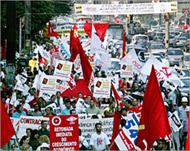Investigations shake Brazilian party
Brazil’s governing Workers Party is reeling after the most extraordinary month in politics since the impeachment trial of a president in 1992.

The revelation by the party’s ex-treasurer that all local election campaigns were funded clandestinely through a second undeclared account on 16 July capped a remarkable fall from grace for the party that was elected on a moral and ethics ticket for the first time in 2002.
The crisis, which has a plot as dramatic as the country’s famous soap operas, began with allegations from the head of the small Labour Party, Roberto Jefferson, that the party had been operating a secret payroll, known as the mensalao, in which it paid off members of allied parties in return for votes in Congress to the tune of $12,500 a month.
A Workers Party official was caught boarding a plane with $100,000 stuffed down his underpants and another $100,000 in a suitcase. When it emerged that he was an aide to the brother of the party president, Jose Genoino, it sparked a high-profile resignation.
Loss after loss
Before Genoino’s fall, it had been the turn of President Luiz Inacio Lula da Silva’s right-hand man and chief of staff, Jose Dirceu. Dirceu had been accused of being the mastermind behind the alleged scheme.
In quick succession, the secretary-general and the treasurer quit as the accusations continued to fly. In all, four founders and some of the biggest names of the 25-year-old party have stepped down pending parliamentary investigations. All maintain their innocence.
The question in the capital, Brasilia, now is whether the investigations went right to the top.
According to a poll, 55% of Brazilians think Lula knew. And for opposition party leader Arthur Virgilio “in the best of hypotheses, he is an idiot. In the worst of hypotheses, he is corrupt”.
Former president Fernando Collor de Mello fled to Miami during a hearing for his impeachment over missing money in 1992 and there were whispers that proceedings could start against Lula if evidence comes to the fore.
Holding firm
But according to a survey published this month, the ratings for his government and that of the president have increased.
 |
|
Lula has kept popularity through |
A stable economy, increased international stature – he was a guest at the G8 summit in Gleneagles, Scotland – and a disarming charisma have maintained Lula’s popularity.
His Zero Hunger programme has helped 12 million families in the past two and a half years even though a promised reverse in the gross inequalities of rich and poor has yet to materialise. Brazil is second to Sierra Leone as the world’s worst distributor of wealth according to figures released by the United Nations last month.
There were suggestions that Lula may do a surprise U-turn and not seek re-election in 2006, handing over to his treasury minister, Antonio Pallocci. But so far, the corruption allegations have failed to stick against the former metalworker and shoeshine boy who was swept to power as Brazil’s first non-elite leader.
Going public
One reason may be the popular notion that corruption is endemic in Brazil and that Lula is the most likely to confront it.
The federal police are investigating all top members of the Workers Party and the parliamentary inquiry into the scandal is centred on advertising executive Marcos Valerio, who was named as the operator of the cash-for-votes scheme. Police investigating Valerio’s firm, DNA, found bundles of documents had been burnt in an attempt to destroy crucial evidence.
Over two weeks it has emerged that he financed the Workers Party with a series of million-dollar loans in a private agreement at the behest of then-party treasurer Delubio Soares.
At first, Soares denied the claims, then he quit and went public over the hush-hush financing of the Workers Party’s election campaigns. He said clandestine deals such as these were common practice for all political parties in the country to avoid paying high bank interest rates. He said all election campaigns, save that of the president, were funded this way.